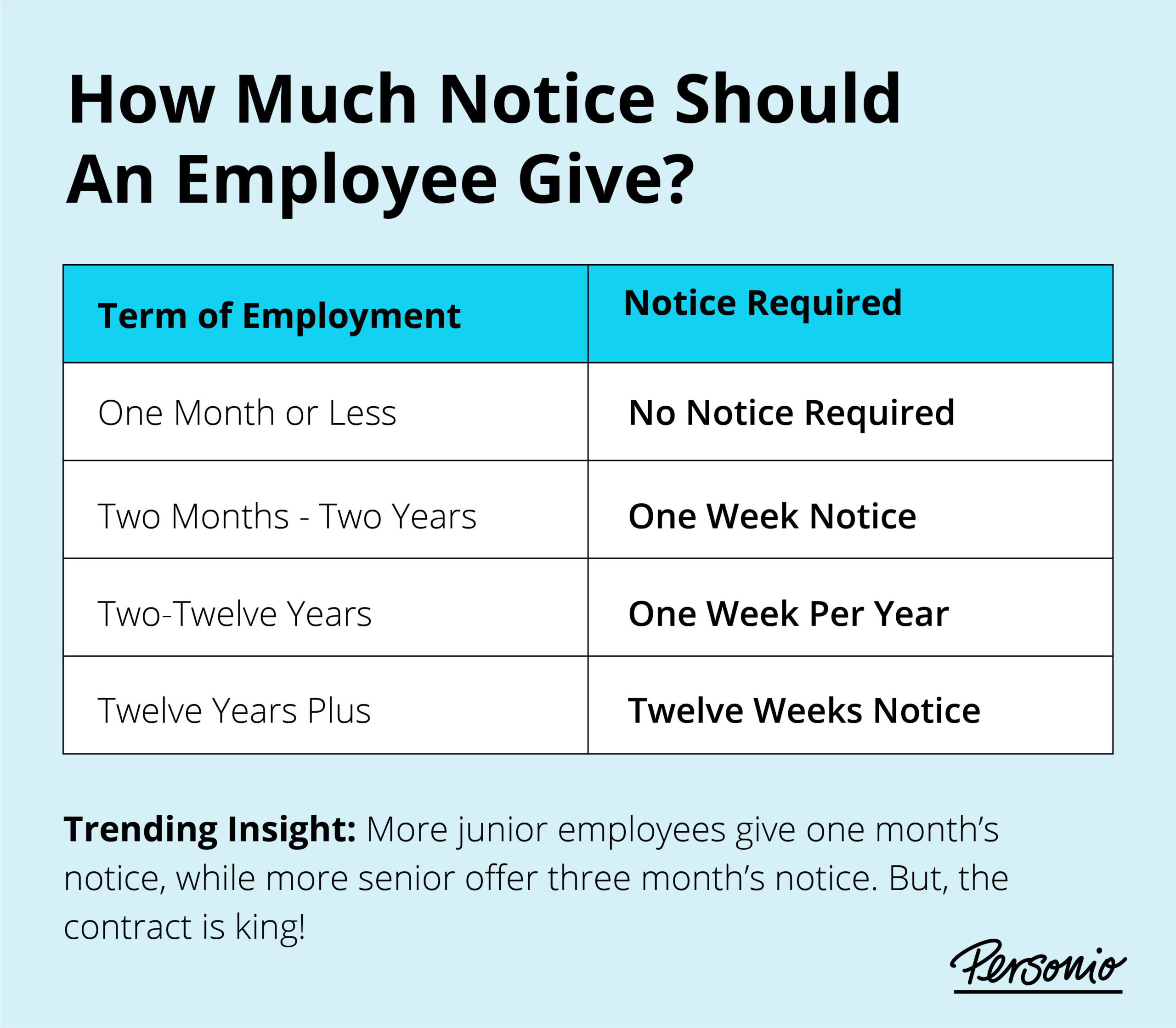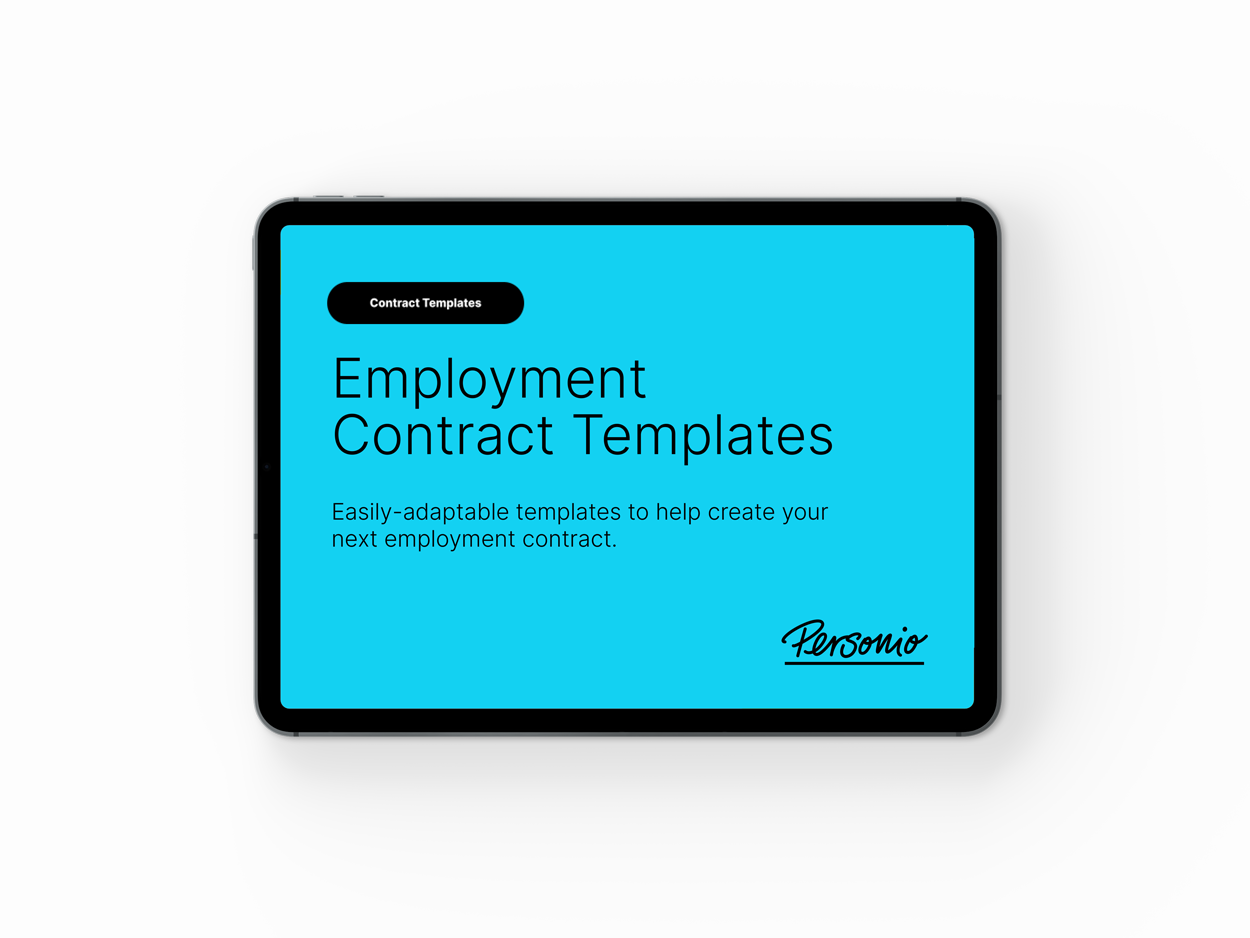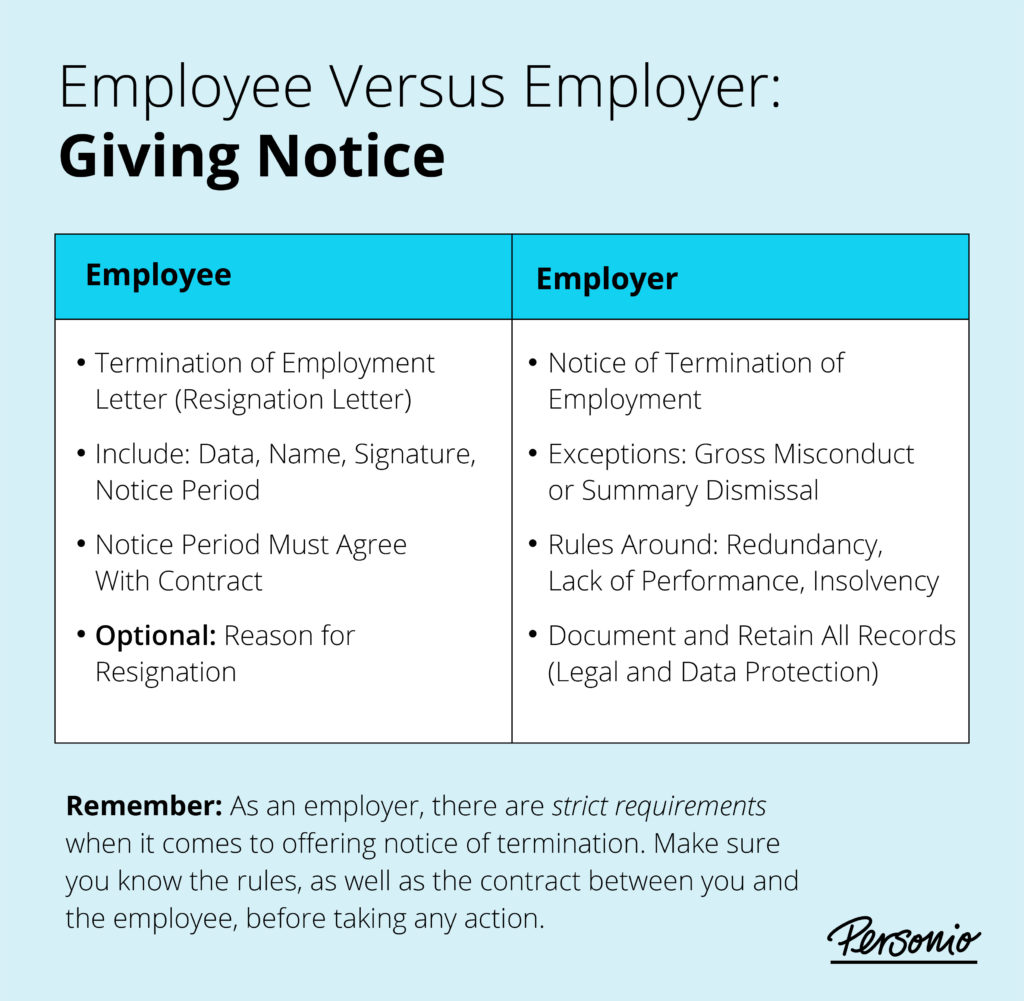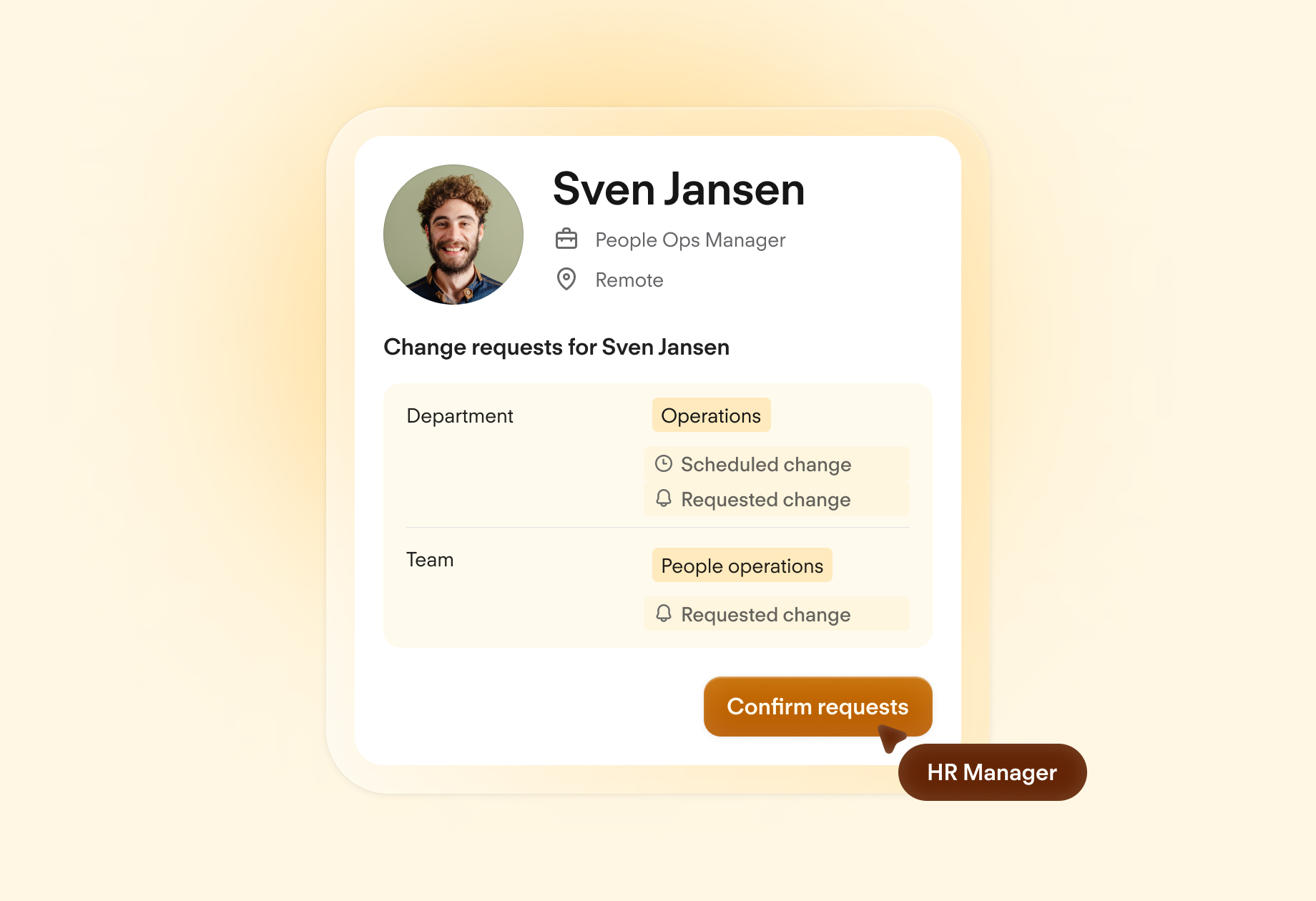What Is a Notice Period?

Notice Period Calculator
Calculation
We use an automated tool to calculate a potential employee's notice period. This result has not been checked by a lawyer or legal professional, and the information is therefore provided without a guarantee. In addition, please note that the notice period calculator does not currently take public holidays into account correctly (the actual result may differ)
An employee gives notice, now what? The entire point of a notice period in the UK is to reduce stress. After all, advance notice is meant to make the transition to a new employee (or employer) easier, and not more difficult.
Notice periods in the UK are determined in two ways: By the government (statutory notice) and by employment contract (contractual notice). In this article, we'll break down all you need to know about notice period and share a notice period calculator below.
Clear, concise notice periods for every employee. Download our employment contract template today.What Is Standard Notice Period in The UK?
In the United Kingdom, legislation about handing in one’s notice states that employees must give at least a week’s notice if they have been in their job for more than a month. But, it is hardly ever this cut and dry.
That’s because notice periods come in different shapes and sizes. It depends on who is serving notice, how long an employee has worked, and even what has been baked into their contract.
Let’s give three key types of notice periods some attention:
Notice Period Type | What It Entails |
|---|---|
1. Statutory | Served by an employer to an employee (in the case of involuntary termination). |
2. Reasonable | Typically served by an employee to their employer, in the case of voluntary resignation. |
3. Contractual | When a contract dictates notice periods, this supersedes typical legal requirements. |
While some sources (nidirect.gov.uk and acas.org.uk) also say that employers must give employees "one week for each complete year (up to a maximum of 12) if employees have been continuously employed for two or more years," it does not appear that this is written in statute.
The confusion may arise because of the statutory redundancy notice period, which is a government requirement (if in doubt, though, please consult an employment lawyer).
The general trend here is that more junior employees are required to give one month’s notice and more senior employees are required to give three months’s notice. However, as in the case of most HR-related documents, the employment contract is king!
UK Notice Period Calculator: Template

The chart below is a helpful reference for notice period calculators in the UK…
Term of Employment | Notice Required |
|---|---|
One Month or Less | No Notice Required |
Two Months - Two Years | One Week Notice |
Two-Twelve Years | One Week Per Year |
Twelve Years Plus | Twelve Weeks Notice |
Trending Insight: More junior employees give one month’s notice, while more senior employees offer three months’s notice. But, the contract is king.
Offboard employees as easily as you onboard them with Personio’s help.
Other UK Employment Subjects Of Note
Are you looking for additional subjects around UK employment to help build stronger HR processes, or to simply get ahold of these topics so you can master them?
Please, feel free to click some of the links below to additional articles that we think you’ll find helpful:
Severance Pay and Redundancy Pay: How they work and how they should be used
The Bradford Factor: Should you use it and how do you calculate it?
Make sure your employment contracts are consistent...

Use our template to offer a consistent employment contract to employees, with all the relevant particulars, notice periods and more. Download it today.
Download yours for freeHow Much Notice Does An Employee Have To Give?
An employee’s notice is dependent on the overall concept of ‘reasonable notice.’ This means, relevant to their role, seniority and even perhaps the timing of their notice, an employee must serve notice that is commensurate with their role and their time at said company.
Moreover, it may also be dependent on what is written into contracts, but that does not preclude an employee’s (or an organisation’s) ability to negotiate a longer or shorter notice period. Especially when it comes to employees serving voluntary notice, this becomes much more of a strategic issue.
When Does An Employee’s Notice Period Begin?
Essentially, it begins the day they serve notice. That is why swift and thorough negotiations, or clear language in contracts, must be established (even beforehand).
This helps employees know exactly how long they will be working for, what they will be expected to do and what employers should expect in exchange.
Often, this is where an HR software for SMEs and small businesses and SMEs can be especially helpful. The moment an employee serves notice, HR can run an automated offboarding workflow to guide them easily through the exit process.
How Much Notice Should Your Company Allow?
That’s up to your company and what is written into contracts. While a month may not seem like a lot of time to fill a junior role, most employers are not prepared to wait a long time before someone accepts a role and joins their new company.
So, giving employees a long notice period can be an advantage if you’re likely to take a long time to fill their role – which is usually the case for more senior employees.
But it can also be an advantage for them, too: Reassuring them they will still have an income for a certain period of time if they are let go.
In the C-suite, it is common for executives to have a six, or even a nine or 12, month notice period. These terms are usually negotiated, and mutually acceptable terms are agreed upon if and when a C-level exec leaves or is asked to leave.
Can Employees ‘Negotiate Out’ Of Notice Periods?
There are no hard-and-fast rules when it comes to negotiating out of notice periods. Generally speaking, though, an employee’s relationship with their employer will dictate their ‘leverage’ in negotiations.
If there is a sense of goodwill and an employee has wrapped up many major initiatives, it may benefit your employer brand to be more flexible and allow them to leave on their own terms.
On the other hand, if an employee still has a lot to do or a lot of knowledge to pass on, it may be in the best interest of the organisation to have them work their entire notice period. And, as the company, this is entirely within your rights.
Can Employees Refuse To Work During Their Notice Period?
In theory, yes. If an employee refuses to work, employers can turn to the conditions of their contract to see if they are in breach of it and are therefore punishable by law. At the same time, if an employee simply refuses to work, it is well within an employer’s rights to deduct their pay in turn.
Can Employers Make Employees Go On Garden Leave?
Garden leave or gardening leave is the term used to describe an agreement made between an employee who resigns and their employer, where they mutually agree that the employee will not come back into the office, or may work remotely, and will still be paid until the end of their official notice period.
Garden leave can be an attractive proposition to employers if an employee who has submitted notice is moving on to a competitor. In that case, it may be best to ‘send them off into the garden’ for the duration of their notice period.
Do Employees Have to be Paid During Their Notice Period in the UK?
Yes, employees are entitled to normal pay during their notice period. That is unless they are in breach of their contractual obligation, but is true even if they are off sick, on holiday, parental leave or available to work even if their employer has nothing for them to do (as is the case for garden leave).
How Much Is Notice Pay?
Notice pay occurs in addition to statutory redundancy pay (we show you how to calculate redundancy pay in this article). Basically, an employer is required to pay an employee throughout the duration of their notice period or in lieu of that (dependant on circumstances which we’ll address next).
Essentially, notice pay is calculated based on the average an employee earns, per week, over the 12-week period before their notice period begins. An employee may receive more, based on the company and the status of their contract, but this is a basic way of understanding it.
What is Payment in Lieu or PILON?
Payment in Lieu of Notice (PILON) can be given to employees when their employment is terminated and it is not desirable for them to carry on working for the company. Employers can pay them a salary or wage instead of whatever their contract says their notice period is. PILON can also be given in redundancy circumstances.
What Happens if There’s a Dispute About Notice Pay?
The gov.uk website says that the first point of call in a notice pay dispute is the company’s formal grievance procedure.
But, if this doesn’t work, employees (or, in this case, ex-employees) can sometimes make a claim to an employment tribunal if they think they have been treated unlawfully. At this stage, the Advisory, Conciliation, and Arbitration Service (Acas) gets involved. More information about employment tribunals is available in this downloadable guide.
Most employment contracts have restrictive covenants in their contract – for example, terms that indicate employees can’t work for a competitor or have contact with customers for a period of time after they leave. The gov.uk advice is clear that a company could take their ex-employee to court if they are found to breach these covenants.
Notice Period Calculator: Employees Versus Employers

How Should Employees Give Notice?
Regardless of how long the notice period is, most contracts require employees to provide a termination of employment letter, more commonly known as a resignation letter. The contents of these vary dramatically but they should include the date of the letter, the employee’s name and signature and the notice period (which must agree with the contract).
Some employees choose to provide a reason for resignation. This is not necessary. It’s more important to document their reasons for leaving in follow-up procedures such as during an exit interview.
Can Employees Give Written Or Verbal Notice?
It depends on what is stipulated in their contracts. That’s why, as an employer, it is essential that you have a clear notice period clause in all of their employee contracts. This way, there is no confusion about what is expected, what is officially ‘giving notice’, and what employees can expect as the next step.
How Should Employers Serve Notice?
The more formal-sounding ‘notice of termination of employment’ is the name typically given to the letter or notice that an employer gives to an employee when they are fired or let go. Be aware: The rules about how and when you can terminate an employee’s contract are very strict in the UK. Again, it’s all about what’s in the contract.
Unless employees are fired for gross misconduct or summary dismissal, when you dismiss someone instantly without notice or pay in lieu of notice, usually because of gross misconduct (for example theft, fraud, or violence), there are strict rules around terminating their contract for redundancy, lack of performance or a company’s inability to pay them (insolvency or bankruptcy).
Whatever you do, be sure to document and retain records of all employee-related leave, benefits, and disputes – it’s not just important in case of legal disputes, it’s also a data protection requirement!
Notice Period Calculator: FAQs for Employees
How Do I Calculate My Notice Period?
As a general rule, this will depend on how long you have been an employee for. According to Acas, if you have worked for less than a month, then legally you do not actually have to give notice (although it is still best practice to do so). For those who have been working for their employer for more than a month, they should give at least one week's notice.
However, your employment contract will often give a longer notice period and if this exists, this is the period of time that you must observe. By respecting this, it ensures that you will not be breaking the notice period section within the contract that you signed.
Is the Notice Period in My Contract Four Weeks or 1 Month?
The general rule of thumb here is to go by the exact wording of your contract. For companies who have specified that they require four weeks' notice, generally this will be exactly four weeks from the date you handed in your written notice. If it is specified as one month, generally it will relate to the same date you hand in your notice, one month later.
How Do You Calculate a 3 Month Notice?
According to PartnersLaw, when a notice period is given in months, it does not necessarily equate to its length in weeks. For example, if you give your notice on February 1st, then your notice period will actually be 13 weeks (as February is a shorter month). For November, it will be 12 weeks. Again, go by the date here rather than the time in weeks.
How Does a 1 Month Notice Period Work?
It may be customary in many sectors to require one month's notice when resigning. According to Acas, what is known as 'giving a month's notice' means that from the day after you hand in your notice, you are starting your month's notice. That is to say that you will finish up on the same date you handed in your notice, one month later.
Disclaimer
We would like to inform you that the contents of our website (including any legal contributions) are for non-binding informational purposes only and does not in any way constitute legal advice. The content of this information cannot and is not intended to replace individual and binding legal advice from e.g. a lawyer that addresses your specific situation. In this respect, all information provided is without guarantee of correctness, completeness and up-to-dateness.


